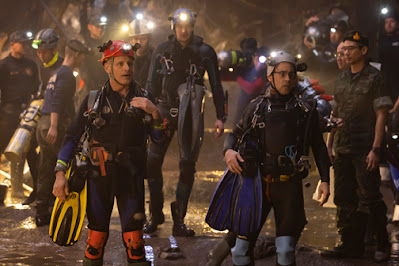Lightning does strike twice in the same spot.
Back in 1995, with Apollo 13, director Ron Howard achieved the impossible: He generated minute-by-minute, edge-of-the-seat suspense despite the fact that we knew, going in, what the outcome would be.
He has achieved the same with Thirteen Lives.
This was another “The whole world is watching” event, during late June and early July 2018. Social media shared updates in real time; eyes were glued to televised news feeds. Given what eventually went down, a big-screen drama was inevitable.
The result — in the hands of Howard and scripters William Nicholson and Don MacPherson — is must-see cinema.
(That said, this is not a film for claustrophobes.)
On June 23, following a playful afternoon scrimmage, 12 members of the “Wild Boars” Thai soccer team, ages 11 to 16, impulsively decide to visit the popular Tham Luang cave beneath Doi Nang Non, a mountain range bordering Thailand and Myanmar. Their assistant coach (played by James Teeradon Sahajak) insists on chaperoning.
Back in their Chiang Rai province village, the team parents have gathered for one boy’s birthday party. When the team fails to show up on time, amid the drenching rain of an unexpectedly early monsoon, one lad — who opted out of the cave excursion — tells where they all went. As a body, everybody rushes to Tham Luang.
They find the boys’ parked bicycles at the cave entrance, but there’s no sign of anybody … and the water level inside the cave is rising rapidly.
What happens next ultimately involves roughly 100 government officials, 900 police officers, 2,000 soldiers and more than 10,000 volunteers from 18 countries, all of whom rapidly build what essentially becomes a bustling pop-up city outside the cave.
It’s barely organized chaos, but Howard has long excelled at finding the small moments and key individuals amid such bedlam; that’s where gripping drama resides. Nicholson and MacPherson’s script enhances the tension by delivering key dollops of information — such as the cave’s length — in small increments.
The film’s first audacious move comes when days pass, and the focus remains on the expanding rescue operation; we get no cut-aways to the boys and their coach, and we wonder: Are they even alive?
On top of which, as we learn more about the lengthy cave’s various zones, twists and turns — now mostly flooded — the situation seems dire. Hopeless. Impossible.



